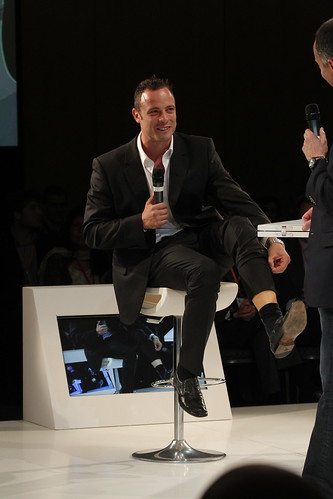‘Blade Runner’ Oscar Pistorius granted parole 10 years after killing girlfriend on Valentine’s Day
Oscar Pistorius #OscarPistorius

Former South African track star Oscar Pistorius has been granted parole, more than 10 years after murdering his girlfriend, model Reeva Steenkamp
The Olympic athlete, 37, who earned the nickname “Blade Runner” for the futuristic carbon-fiber prosthetics he used for competitions, had been sentenced to 13 years and five months after he was convicted of murdering the TV reality star in the early morning hours of Valentine’s Day, 2013.
On Friday, the Department of Correctional Services in South Africa granted him parole, effective Jan. 5. He will be subject to conditions, including that he not leave the area of Pretoria where he is set to live without permission from authorities.
Pistorius will also attend a program to deal with his anger issues and will have to perform community service. Pistorius’ parole conditions will be in place for five years, the Department of Corrections said. Serious offenders in South Africa must serve at least half of their sentence to be eligible for parole, which Pistorius has done.
Oscar Pistorius weeping in court in 2014 during trial. Pistorius was granted parole on Friday, more than 10 years after killing his girlfriend. (Phill Magakoe/Reuters)
BLADE RUNNER OSCAR PISTORIUS: A LOOK BACK AT THE OLYMPIAN’S METEORIC RISE AND FALL
Pistorius testified at his murder trial that he killed Steenkamp by mistake, thinking she was a dangerous intruder hiding in his bathroom in the middle of the night when he fired four times through the door with his licensed 9mm pistol.
Prosecutors argued that Steenkamp, 29, had fled to the toilet cubicle during a late-night argument and Pistorius killed her in a rage.
Pistorius was initially convicted of culpable homicide — a charge comparable to manslaughter — for killing Steenkamp. That conviction was overturned and he was convicted of murder after an appeal by prosecutors. They also appealed against an initial sentence of six years for murder, and Pistorius was ultimately sentenced to 13 years and five months in prison.
A photo combination showing Reeva Steenkamp celebrating her last birthday on Aug. 12, 2012, and, on the right, a relative clutching a funeral program six days after Oscar Pistorius shot her to death Feb. 14, 2013. (Stephanie Makhlouf/Alexander Joe both via Getty)
The disabled athlete, the first to compete against able-bodied men, was once hailed as the most inspirational figure in sports.
But that image was shattered when he fired four shots into a bathroom stall in his Pretoria home in an upscale gated community, killing Steenkamp, his girlfriend of three months.
OSCAR PISTORIUS DOCUMENTARY DETAILS OLYMPIAN’S ‘FALL FROM GRACE’ AFTER MURDER CONVICTION, DIRECTOR SAYS
Pistorius was born in Johannesburg, South Africa, with a congenital abnormality that left him without a fibula bone in either of his lower legs.
His legs were amputated below the knee when he was 11 months old — but his mother taught him that his disability was not an excuse and pushed him to participate in sports.
A photo of Steenkamp with Pistorius on Jan. 13, 2013, left, and a portrait of Steenkamp, right. Pistorius fired four shots into a bathroom stall in his home killing Steenkamp, his girlfriend of three months. He was granted parole on Friday. (Waldo Swiegers/Mike Holmes both via Getty )
After obtaining his first carbon-fiber prosthetics, Pistorius competed in the 2004 Paralympic Games in Athens and won gold in the 200 meters. He soon became the world’s most famous disabled athlete.
At the 2008 Paralympics, Pistorius won gold in the 100, 200 and 400 meters, setting world records in all three categories.
Oscar Pistorius walks on his stumps during argument in mitigation of sentence by his defense attorney Barry Roux in the High Court in Pretoria, South Africa, Wednesday, June 15, 2016. Pistorius was granted parole on Friday, more than 10 years after killing his girlfriend. (AP Photo/Alon Skuy, Pool via AP)
CLICK HERE TO GET THE FOX NEWS APP
He also began competing against non-disabled athletes, but many critics complained that his carbon-fiber blades gave him an unfair advantage.
At the pinnacle of Pistorius’ career, he competed at the 2012 London Olympics, becoming the first amputee to race in an Olympic track event, and he was chosen to carry South Africa’s flag at the closing ceremony.
The Associated Press contributed to this report.
Michael Dorgan is a writer for Fox News Digital and Fox Business.
You can send tips to michael.dorgan@fox.com and follow him on Twitter @M_Dorgan.